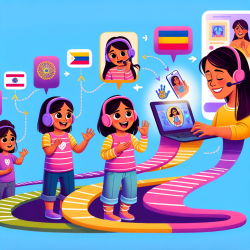Introduction
The COVID-19 pandemic has undeniably reshaped many aspects of our lives, not least of which is the mental health landscape. As practitioners in the field of speech-language pathology, particularly those involved with online therapy services like TinyEYE, understanding the nuances of mental health trends during this period is crucial. The study titled Associations of lockdown stringency and duration with Google searches for mental health terms during the COVID-19 pandemic: A nine-country study offers valuable insights into how lockdown measures influenced mental health concerns across different countries. This blog explores how these findings can inform and improve therapeutic practices for children.
Understanding the Study
The research examined the relationship between lockdown stringency and duration with Google search trends for mental health terms such as "Anxiety," "Depression," "Suicide," and "Mental Health" across nine countries. The study found that lockdown duration and certain policies were generally associated with lower Google searches for selected mental health terms, indicating a complex interplay between public health measures and mental health awareness or concern.
Implications for Practitioners
For practitioners, these findings suggest several actionable insights:
- Adaptability in Therapy: The decrease in searches for "Anxiety" and "Depression" during stringent lockdowns could imply a normalization of these feelings or a lack of resources to address them. Practitioners should be prepared to address these issues proactively, even if they are not immediately apparent.
- Focus on School Closures: The positive association between school closures and searches for "Depression" highlights the impact of educational disruptions on children's mental health. Tailoring interventions to support children in managing these disruptions is essential.
- Utilizing Technology: The reliance on Google searches for mental health information underscores the importance of integrating digital tools and resources into therapy. Providing children and their families with reliable online resources can complement therapeutic efforts.
Encouraging Further Research
While this study provides a foundational understanding, it also opens avenues for further research. Practitioners are encouraged to explore how these findings can be localized to their specific contexts and populations. Investigating the long-term effects of lockdowns on children's mental health and the role of online therapy in mitigating these effects could yield valuable insights.
Conclusion
The insights from this study are not just academic; they are a call to action for practitioners committed to improving mental health outcomes for children. By leveraging data-driven insights and adapting to the evolving landscape of mental health, practitioners can better support the children and families they serve.
To read the original research paper, please follow this link: Associations of lockdown stringency and duration with Google searches for mental health terms during the COVID-19 pandemic: A nine-country study.










